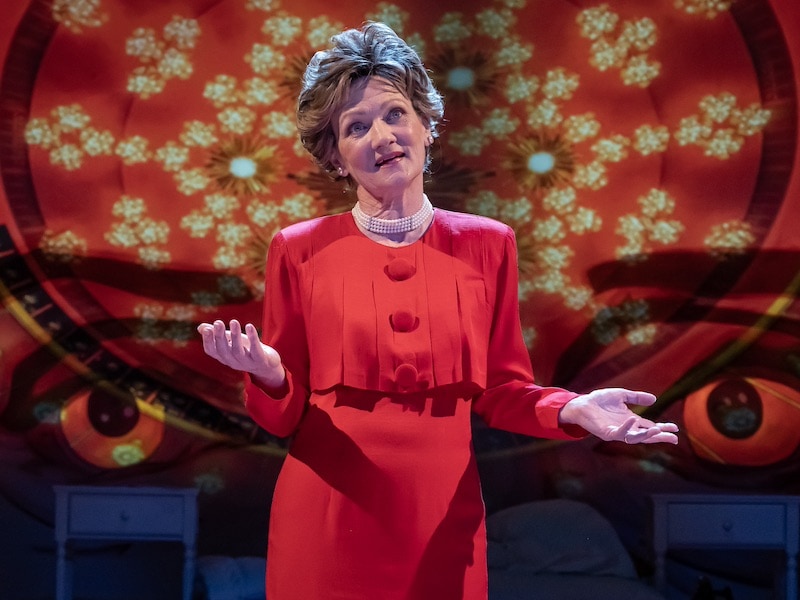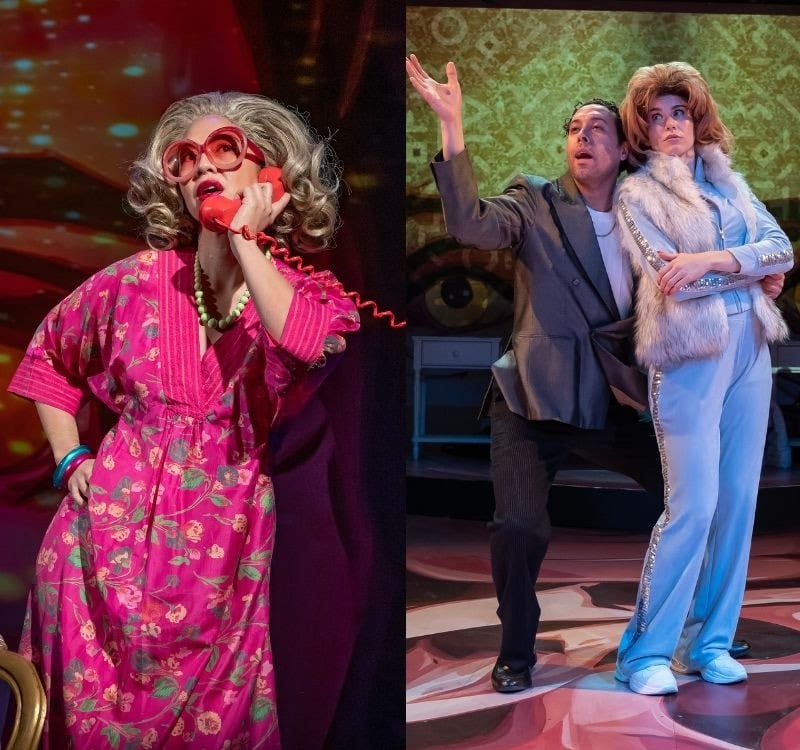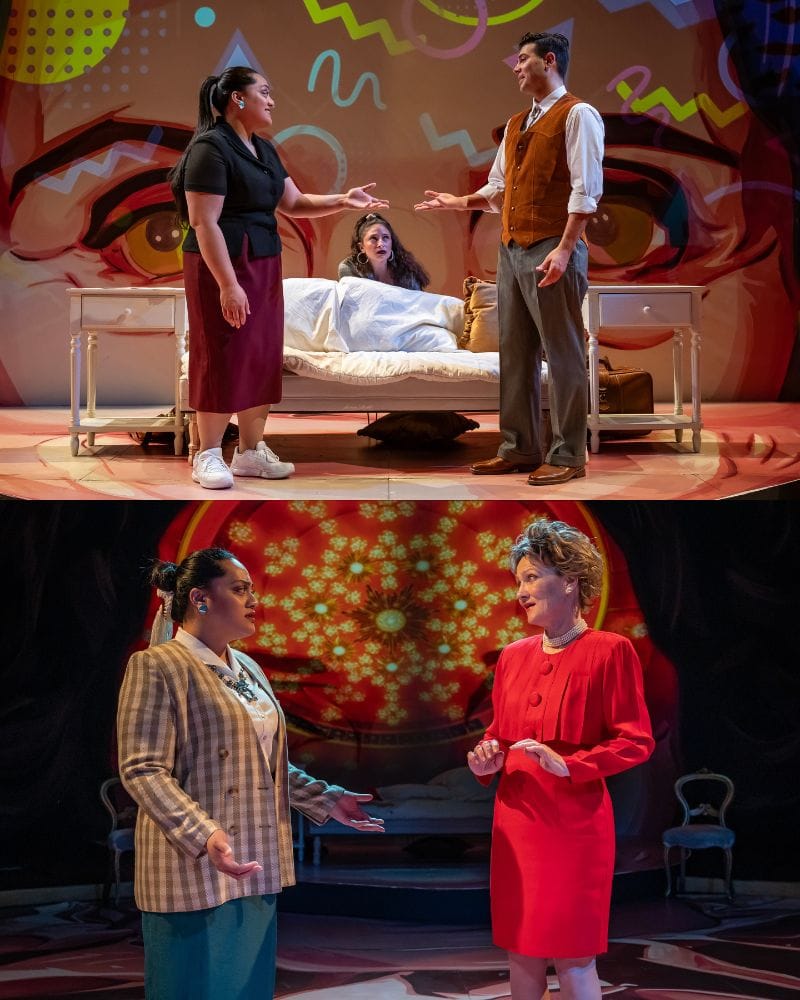By Jillian Parks
For the next month, when audience members enter Mosaic Theater’s black box, they will be greeted by a large pair of eyes, painted in pink, on the back wall. These eyes belong to Nancy Reagan, and rather than reducing her to a White House portrait and a color-coordinated outfit, the world premiere of Nancy enlivens these eyes with a superstitious, intense yet sensitive, hilarious picture of the First Lady of the Reagan administration.

Written by Rhiana Yazzie and directed by Ken-Matt Martin, the play follows two storylines that briefly intersect at the end. One follows Nancy Reagan, played by Lynn Hawley, in the aftermath of the assassination attempt on Ronald Reagan, played by Michael Kevin Darnall. Amid the uncertainty, Nancy turns to an astrologer, Joan Quigley, who is played by Regina Aquino. The second storyline follows two Navajo women — Esmeralda, played by ‘Anaseini Katoa, and her daughter Jacqueline, played by Tenley Stitzer — as they navigate the difficulties of empowering Native women in the 1980s.
While I cannot speak to the degree of historical accuracy throughout the play, the playwright anchors the show in real, major historical moments (and scandals) from that period, including uranium mining on sacred Native American land; Princess Pale Moon (“America’s Contemporary Pocahontas”), played by Jen Olivares; and pivotal foreign policy decisions made while Reagan was in office.
Despite its historical bent and heavy themes, the show is a satire, and it succeeds at being truly funny. The actors are largely to thank for this, but the play itself is also written with really funny lines and conventions. Hawley plays a caricature of Nancy Reagan: she laughs without moving her face, she laments the shared limelight when she undergoes a mastectomy, and she hates, hates, hates White House Chief of Staff Don Regan. Katoa plays a self-assured, easily excited, accomplished foil of Nancy, which also lends itself to great comedic moments.
Nancy Reagan’s costuming throughout (designed by Moyenda Kulemeka) is phenomenal: always matching, often shoulder-padded; and her wig (designed by Larry Peterson) is the perfect, ridiculous fit for this satirical show. Costumes and wigs in general were appropriate and funny when they needed to be with clear cultural influences and alliances.
The scenic design by Misha Kachman, projections by Hailey LaRoe, lighting design by Sherrice Mojgani, and sound design by Navi all fit with the show’s ambitious task of satirizing the ’80s, politics, and contemporary conversations about privilege and right while telling two parallel storylines. Though this ambition paid off in the show’s comedy, it did little to anchor the show’s seriousness.

Above Nancy’s giant, painted eyes, small TVs play relevant news clips and videos that aim to connect the national news to Nancy’s and Esmeralda’s respective lives. Scene transitions are often psychedelic projections of moving lights, space, stars, and astrology symbols projected onto the forehead, or the mind, of Nancy herself. Fun ’80s music often accompanies those transitions alongside colored lights and sometimes music videos, projected onto Nancy’s mind as well.
While these things are visually interesting, they seem only loosely related to the action. For the most part, the show felt disjointed, like a scene-setting that repeatedly reminded people It is the ’80s! but nothing more.

That disjointed feeling played into the reception of the play’s more serious moments. Relationships were underdeveloped, particularly the romantic one between Esmeralda and Whaley, played by Derek Garza, which began and dissipated in the course of a couple scenes. After roughly an hour and a half of satirical ridiculousness, the show pivoted, suddenly asking us to take seriously what happened, rather than hinting at it and preparing us for it. The exception was the final car scene between Esmeralda and Jacqueline. Because that mother-daughter relationship had been long established and those characters had had moments of honesty and seriousness, that scene gave me goosebumps, and I believed there was something real at stake.
Some lines at the opening night performance I saw were skipped, which was apparent when dialogue became unconnected with large gaps of silence. One actor broke character, delivered a flustered apology to the audience, and called for a line in the middle of the scene. A small black box space can be unforgiving with those kinds of slip-ups.
While the lead-up could have been better executed, the final sequence was a moving, thoughtful questioning of the excuses people in authority give for not being able to do anything to change major injustices or evils. Esmerelda, Jacqueline, and Nancy Reagan all come face-to-face at the end, and the two Native women implore her to talk to her husband and fight for tangible steps to be taken in removing radioactive uranium from reservations, specifically the Navajo people’s.
Nancy tells them, “There is no authority. No one is in charge,” and basically no one is going to help you. The ending sequence follows with projections and a series of facts about the great lengths Nancy herself went to in advancing Alzheimer’s research and legislation. It is a not-so-subtle reminder that change is possible, and empathy can advance goodness; people just have to care on a personal level.
Nancy endeavors to satirically dramatize the frustrations of being both Native American and a woman trying to enact change when the people with the power to institute it are unable to see or empathize with those struggles. With solid comedic timing and truly talented actors, the satire is laugh-out-loud funny. Without the veil of satire, the show’s more serious moments lack the punch they could have packed. Hopefully, as the run continues through April 21, comfort with the material will increase, and the serious moments will get the performance they need.
Running Time: Two hours and 15 minutes with an intermission.
Nancy plays through April 21, 2024, presented by Mosaic Theater Company in partnership with New Native Theatre performing in the Sprenger Theater at Atlas Performing Arts Center, 1333 H Street NE, Washington, DC. Purchase tickets ($42–$70) online or from the Box Office at (202) 399-7993 x501 or [email protected] from 11 AM–5 PM Monday through Friday, or two hours prior to a performance.
The program for Nancy is online here.
COVID Safety: Mosaic Theater aligns its safety protocols with those of the Atlas Performing Arts Center. Masking is recommended but is now optional.
Nancy
By Rhiana Yazzie
Directed by Ken-Matt Martin
CAST
Regina Aquino (Joan/Ensemble; she/her/siya)
Michael Kevin Darnall (Reagan et al.)
Derek Gaza (Whaley/David Lee Roth; he/him)
Lynn Hawley (Nancy Reagan)
Anaseini Katoa (Esmeralda; she/her)
Jen Olivares (Princess Pale Moon/Joey)
Tenley Stitzer (Jacqueline; she/her)
CREATIVE TEAM
Misha Kachman (Set Design)
Moyenda Kulemeka (Costume Design)
Larry Peterson (Wig Design)
Sherrice Mojgani (Lighting)
Navid Azeez (Sound)
Chelsea Dean (Properties)
Hailey LaRoe (Projections Designer)
Sierra Young (Fight & Intimacy Director)
Chelsea Radigan (Dramaturgy & Casting Director)
Victor Vazquez (Casting).
Shayne O’Neill (Production Stage Manager)
Reflection Series/Talkbacks
• April 4 after the evening performance of Nancy at Mosaic Theater: a talkback with Janet Clark, Supervisory Cultural Arts Program Specialist at the Smithsonian National Museum of the American Indian.
• April 14 after the matinee performance of Nancy at Mosaic Theater: a talkback with the artists.
 Jillian Parks is a junior Rhetoric and Media major at Hillsdale College; however, she devotes the bulk of her time to her Journalism minor. She grew up doing and teaching community theater, which has bled directly into the kinds of writing she is passionate about. This past semester she served as Culture editor of the campus newspaper, The Collegian, highlighting everything from student projects to New York City debuts. She also works as the Digital Director for the college’s radio station and co-hosts a weekly podcast on factual disparities in social media narratives.
Jillian Parks is a junior Rhetoric and Media major at Hillsdale College; however, she devotes the bulk of her time to her Journalism minor. She grew up doing and teaching community theater, which has bled directly into the kinds of writing she is passionate about. This past semester she served as Culture editor of the campus newspaper, The Collegian, highlighting everything from student projects to New York City debuts. She also works as the Digital Director for the college’s radio station and co-hosts a weekly podcast on factual disparities in social media narratives.
SEE ALSO:
Rhiana Yazzie on ‘Nancy,’ her play premiering at Mosaic Theater (interview by Ravelle Brickman, March 23, 2024)





I saw this at the final preview, and the performance was pitch perfect. In fact, I was blown away by the combination of satire and realism, each underscoring the other and heightening the impact of the play. Nancy, in my opinion, is passionate and funny, powerful and sad. The ending was profoundly moving. Kudos to playwright Yazzie, director Ken-Matt Martin and the entire cast for a terrific production. I urge readers to rush out and see this while you can!